White Read online
ALSO BY BRET EASTON ELLIS
Imperial Bedrooms
Lunar Park
Glamorama
The Informers
American Psycho
The Rules of Attraction
Less Than Zero
THIS IS A BORZOI BOOK PUBLISHED BY ALFRED A. KNOPF
Copyright © 2019 by Bret Easton Ellis Corporation
All rights reserved. Published in the United States by Alfred A. Knopf, a division of Penguin Random House LLC, New York, and distributed in Canada by Random House of Canada, a division of Penguin Random House Canada Limited, Toronto.
www.aaknopf.com
Knopf, Borzoi Books, and the colophon are registered trademarks of Penguin Random House LLC.
Grateful acknowledgment is made to Farrar, Straus and Giroux, and Janklow & Nesbit Associates, for permission to reprint an excerpt from “The White Album,” from The White Album by Joan Didion. Reprinted by permission of Farrar, Straus and Giroux and Janklow & Nesbit Associates.
Library of Congress Cataloging-in-Publication Data
Names: Ellis, Bret Easton, author.
Title: White / by Bret Easton Ellis.
Description: New York : Alfred A. Knopf, 2019. | “This is a Borzoi book published by Alfred A. Knopf.”
Identifiers: LCCN 2018050947 (print) | LCCN 2018055342 (ebook) | ISBN 9780525656319 (ebook) | ISBN 9780525656302 (hardcover) | ISBN 9781524711566 (open market)
Subjects: LCSH: American essays—21st century.
Classification: LCC PS3555.L5937 (ebook) | LCC PS3555.L5937 W48 2019 (print) | DDC 814/.54—dc23
LC record available at https://lccn.loc.gov/2018050947
Ebook ISBN 9780525656319
Cover design by Chip Kidd
v5.4
ep
Contents
Cover
Also by Bret Easton Ellis
Title Page
Copyright
Dedication
Epigraph
[Somewhere in the...]
[The idea of...]
empire
acting
second self
post-sex
liking
tweeting
post-empire
these days
A Note About the Author
FOR MATTHEW SPECKTOR
Society mediates between the extremes of, on the one hand, intolerably strict morality and, on the other, dangerously anarchic permissiveness through an unspoken agreement whereby we are given leave to bend the rules of the strictest morality, provided we do so quietly and discreetly. Hypocrisy is the grease that keeps society functioning in an agreeable way.
JANET MALCOLM, The Journalist and the Murderer
Somewhere in the last few years—and I can’t pinpoint exactly when—a vague yet almost overwhelming and irrational annoyance started tearing through me maybe up to a dozen times a day. This annoyance was over things so seemingly minor, so out of my usual field of reference, that I was surprised by how I had to take a deep breath to dismantle this disgust and frustration that was all due to the foolishness of other people: adults, acquaintances and strangers on social media who offered up their rash opinions and judgments, their mindless preoccupations, always with an unwavering certitude that they were right. A toxic attitude seemed to drift off every post or comment or tweet whether it was actually there or not. This anger was new, something I’d never experienced before—and it was tied in with an anxiousness, an oppression I felt whenever I ventured online, a sense that I was going to somehow make a mistake instead of simply offering an opinion or make a joke or criticize someone or something. This idea would have been unthinkable ten years earlier—that an opinion could become something wrong—but in an infuriated, polarized society people were blocked because of these opinions, and unfollowed because they were perceived in ways that might be inaccurate. The fearful began to instantly see the entire humanity of an individual in a cheeky, offensive tweet and were outraged; people were attacked and unfriended for backing the “wrong” candidate or having the “wrong” opinion or for simply stating the “wrong” belief. It was as if no one could differentiate between a living person and a string of words hastily typed out on a black sapphire screen. The culture at large seemed to encourage discourse but social media had become a trap, and what it really wanted to do was shut down the individual. What often activated my stress was that other people were always angry about everything, presenting themselves as enraged by opinions that I believed in and liked or thought were simply innocuous. My pushback against all of this forced me to confront a degraded fantasy of myself—an actor, as someone I never thought existed—and this, in turn, became a constant reminder of my failings. And what was worse: this anger could become addictive to the point where I just gave up and sat there exhausted, mute with stress. But ultimately silence and submission were what the machine wanted.
The idea of beginning a new novel started whispering to me sometime in the first weeks of 2013, while I was stuck on the I-10 in traffic merging into Hollywood after I had just spent a week in Palm Springs with a friend I’d gone to college with in the 1980s, and who was now losing her mind. (She had broken down in front of me several times during those days in the house on Azure Court, before leaving earlier than expected to attend a Deepak Chopra retreat in San Diego. And, yes, I know how this sounds.) In Palm Springs I was unexpectedly crippled with waves of anxiety that kept me in bed for hours staring at my phone—vague yet vast realizations about mortality that my friend’s frailties had activated and encouraged—while also, absurdly, furiously going through the last demented round of notes on a pilot I was writing for the CW Network. Between the bouts of fear and the never-ending phone calls from the production company and the rewrites, the thought that I might never write another novel announced itself more loudly than it had in years—and my last novel had been completed in 2009. Why this idea asserted itself at this particular time I can’t tell you. The desire to write prose had kept pulsing faintly within me for years but not within what I now saw as the fake enclave of the novel. In fact I’d been wrestling away from the idea of “the novel” for more than a decade, as evident in the last two books I published: one was a mock memoir wrapped within a horror novel, and the other was a condensed autobiographical noir I pushed through painfully during a midlife crisis, a story about my first three years back in Los Angeles futilely working on movies after I’d lived in New York for almost two decades.
For those past five years I had no desire to write a novel and had convinced myself I didn’t want to be constrained by a form that didn’t interest me anymore. (And yet I was willing to be constrained by the conventions of the hundred-page screenplay that would never be made and the five-act TV pilot that would never be shot.) I had reiterated all of this firmly in interviews I’d given over that period, during the world tour for that last novel I’d written, at press junkets in Spain, in Copenhagen, in Melbourne. But out in the desert that feeling evaporated, and between the notes calls and the fear tamped down by Xanax and tequila, as the mountains surrounding the house darkened beneath the late-afternoon winter skies, the first paragraph of a novel began to take shape. It started with an image revolving around the bone-white Emser Tile sign situated on a rooftop at the intersection of Santa Monica Boulevard and Holloway Drive: the view from behind the windshield of a stolen car, a violent accident, an unfolding mystery, something about the past, that last year in high school, intimations of a murder disguised as a suicide, somebody pretending to be somebody he wasn’t, an actor.
* * *
…
I’ve never forced a novel, something my agent and publishers and readers might think is part of an overall problem with me as a writer, or as a brand, namely because I’ve gone five or seven or eight years between books at a time when most people still expect a brand-name novelist to publish every other year like clockwork. This was what my publishing house had expected of me in the 1980s after my first novel was a success, and I still remember my shock at being told this. In the end I never worked like that, and yet this didn’t ever mean I wasn’t writing. It meant only that I wrote in a way that simply worked best for me. I wasn’t thinking about anyone else when I wrote—I wasn’t aware of an audience waiting for me outside my apartment, and I never really cared what my agent or editor or publisher expected from me. With my publisher I made sure deadlines (if any) were flexible (and they were), and in return I agreed to publicize the books as much as the publisher required me to. And I never succumbed to the temptation to give an audience what I thought they might have wanted: I was the audience and I was writing to satisfy myself, and to relieve myself from pain. I rarely gave interviews between book publications because part of the process was still mysterious to readers, with a kind of secret glamour that added to the excitement with which books were once received, whether negatively or positively.
But novels don’t engage with the public on that level anymore. I’d wistfully noticed the overall lack of enthusiasm for the big American literary novels the autumn before I met that friend in Palm Springs, but I also realized that’s nothing to worry about. It’s only a fact, just as the notion of the great American studio movie or the great American band has become a smaller, narrower idea. Everything has been degraded by what the sensory overload and the supposed freedom-of-choice technology has brought to us, and, in short, by the democratization of the arts. I started feeling the need to work my way through this transition—to move from the analog world in which I used to write and publish novels into the digital world we live in now (through podcasting, creating a web series, engaging on social media) even though I never thought there was any correlation between the two. After that week in the desert with the friend I’ve known for thirty years, after I’d seen her driven mad by her life while I endured the endless rewrites of a sci-fi pilot that was never going to happen, something in me finally cracked and I began making notes for a novel in that last week of January. But it has never turned into anything either.
e m p i r e
I was unusually attracted to horror movies as a kid growing up in the San Fernando Valley of the 1970s, when they spoke to me in a way nothing else seemed to. I might have known one or two believers who loved them as well, but for the majority of my friends in that movie-mad decade, horror was just another genre, no more meaningful to them than the teen sex comedy or the disco musical. But what was it about horror movies—and horror novels and comic books—that caught my attention more than anything else? On its surface, the house I grew up in was just another modest upper-middle-class home along the edges of the hills in Sherman Oaks, but below that surface was a hugely dysfunctional gray zone. I grasped that dysfunction at a very early age and checked out, realizing I was alone. As a 1970s kid there were no helicopter parents: you navigated the world more or less on your own, an exploration unaided by parental authority. In retrospect my parents, like the parents of the friends I grew up with, seemed incredibly nonchalant about us, not at all like parents today who document their children’s every move on Facebook and pose them on Instagram and urge them into safe spaces and demand only positivity while apparently trying to shelter them from everything. If you came of age in the 1970s this was most definitely not your childhood. The world wasn’t about kids yet.
* * *
…
I remember long stretches when I might not have even seen my father apart from the occasional weekday breakfast or dinner on Sunday, as from Monday to Friday he would have left for his job at a downtown real-estate firm before my sisters and I were awake and wouldn’t return to the house in Sherman Oaks until we had finished dinner and were contemplating homework in front of the TV sets in our separate bedrooms. At five and six and seven years old, we walked to elementary school by ourselves (parents are now arrested for allowing this) and we played physical games about wars and monsters and espionage throughout the neighborhood streets and up into the canyons that bisected the hills of Sherman Oaks and Studio City and Encino. We would walk home from school alone, grab something to eat in an empty kitchen and then bike a few streets over to someone else’s house where it also seemed only kids were living. If we happened to glimpse or actually say hi to somebody’s mom, any conversation would be brief and we were always eager to move on, to be on our own again, to find out about the world by ourselves, away from our practically nonexistent parents.
We always seemed to be active, in motion, whether in playgrounds and parks, or splashing in a friend’s pool or on the beach wading into the Pacific, or just hanging out at the pinball and video arcade in Westwood Village while Blue Oyster Cult and ELO played as a distant soundtrack over everything. Television consisted of only a few dozen shows that aired nightly on three networks between eight and eleven, and from seven until noon on Saturday mornings—and that was it. Compared to today’s choices ours were remarkably sparse, so most of the time we were on suburban streets and in arcades and malls and the beach and at Saturday double and triple matinees on our own, acting out grown-up scenarios by ourselves, feeling our way toward the sexual maturity of adolescence. On a rare weekday afternoon I might stay inside and lounge on the green shag carpet in the living room, or on the waterbed we had, briefly, in the house on Valley Vista, if I was caught up in a comic book or novel I couldn’t tear myself away from. At that age I could read a novel in a day, concentrating on nothing else; this was how I absorbed everything from Harriet the Spy to the Little House books. But usually I read after dark, deep into the middle of the night, and this was how I first experienced Carrie, the novels of James Herbert and the Warren comics I’d become obsessed with during those years—Eerie, Creepy, Vampirella. As a child left to his own devices, all of these horror novels—like the movies I also consumed—confirmed something for me.
I was a child of the ’70s who read Thomas Tryon’s popular horror novel The Other when I was seven years old, balancing the hardcover my mother had checked out of the Sherman Oaks public library on my lap while I waited for another swimming lesson on Ventura Boulevard. The pitchfork death of one of the boys at the end of the first part of that novel stunned me—became infamous for me—because it was the only detailed murder I had come across in print, and it has haunted me ever since. I wanted to know on a technical level how the author had pulled this scene off, so I read it over and over again, gazing at the paragraphs, enrapt, figuring out how the author linked the words up to give this scene its charge. The books I read and the movies I watched insisted that the world was a random and cruel place, that danger and death were everywhere, that adults could help you only so much, that there was another world—a secret one beneath the fantasy and fake safety of everyday life. Horror movies and horror fiction helped me grasp all of this at an early age. By the time I read Stephen King’s Night Shift, his first collection of stories in 1978—having already read Carrie, Salem’s Lot and The Shining numerous times—few illusions about the supposed neutral innocence of my childhood, or anybody else’s, remained.
* * *
…
Our parents were lenient about entertainment. R-rated movies were most often okay, and rarely were restrictions placed on what we read or listened to. I remember seeing National Lampoon’s Animal House with my father at a Saturday matinee in the summer of 1978 at the Avco Theater in Westwood, when I was fourteen and where he and I laughed pretty much nonstop. My father had no problems with the nudity, the sex with a minor, the racy humor (including the dildo Otter holds up), the hand jobs and the topless pillow fights, or with the overall anti-establishme
nt vibe of the picture, which he seemed to enjoy immensely even though he was clearly very much a member of the establishment. (Part of his pleasure had to do with the fact he’d gone to college in the early 1960s as well, the same time as these characters.) I remember my mother clandestinely taking me to a theater in Studio City for a weeknight showing of Saturday Night Fever in January 1978 when I was thirteen, because she had a crush on Travolta and we’d been playing the soundtrack for almost two months now in her car after she picked us up from school and drove us to haircuts and piano lessons. (Yes, this was a white, upper-middle-class childhood at the height of Empire.) The movie was a grown-up hard-R thrill and the men in Tony Manero’s posse were so powerfully masculine to me they became a big part of my fantasy life until about a year afterward, when Richard Gere pointed me in another direction.
This was a time when parents decided what movies to see and the kids just went. In 1975 I saw Hal Ashby’s Shampoo on Easter night in Palm Springs with my aunt and two cousins also my age, and my parents who didn’t mind that we saw it but were mortified that we turned out to be the only children in the packed theater at the eight p.m. show. As boomers, they thought it made them look bad. Shampoo was risqué in ways that my parents weren’t expecting—maybe they’d anticipated something frothier, something lighter—and I sat alone in one of the few empty rows up front, away from the rest of the packed theater, blushing deeply. (“I want to suck his cock,” Julie Christie said drunkenly, gesturing to Warren Beatty at a dinner at the Bistro in Beverly Hills before slipping under the table to blow him.) My pleasure was intensified by how sure I was that my father would have a fit after the movie was over—again, not because of the content, but because bringing his child to this film in front of hundreds of other people had embarrassed him. And he did have that fit, even though he pretended not to recognize the three kids trailing after him and my mother and my aunt, as together the adults speed-walked to the car in the theater’s parking lot off of North Palm Canyon Drive.

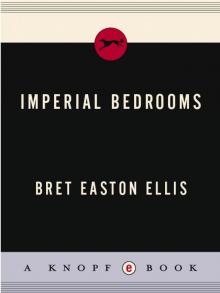 Imperial Bedrooms
Imperial Bedrooms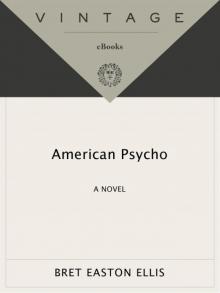 American Psycho
American Psycho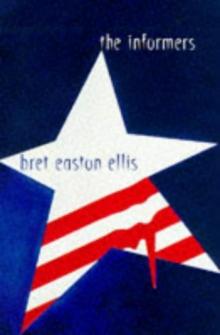 The Informers
The Informers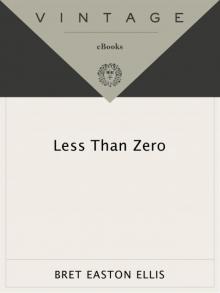 Less Than Zero
Less Than Zero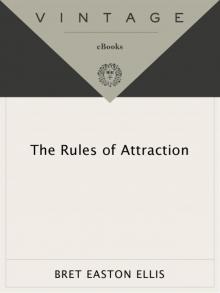 The Rules of Attraction
The Rules of Attraction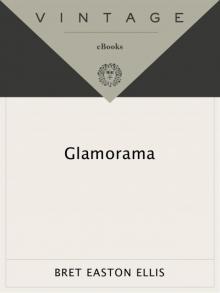 Glamorama
Glamorama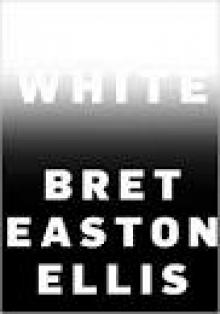 White
White